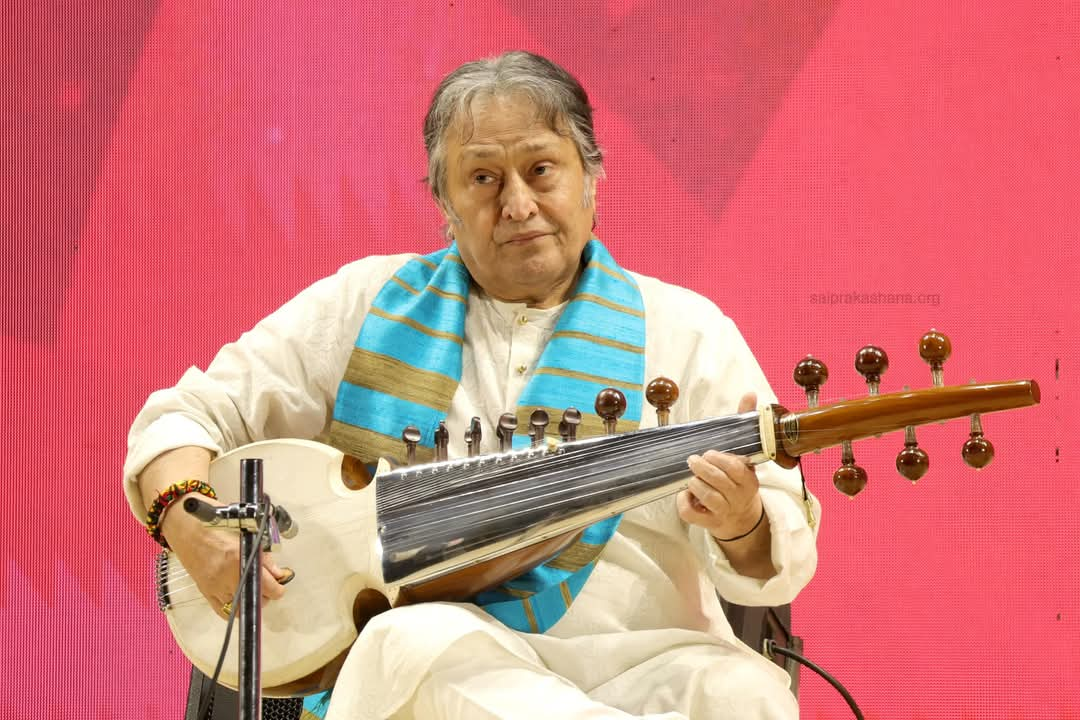Interviewing Amjad Ali Khan, the renowned sarod master, for Downtown Mirror India was a truly unforgettable experience. We were spellbound with this musical legend as we conversed with him when he was on his musical tour in the USA, surrounded by the subtle details of Indian classical music. Khan Saab revealed the secrets of his enchanting performances and stories about his illustrious career with an unassuming approach. He offered perspectives that only a master musician can offer on the complexities of the sarod, the art of improvisation and the fine line between tradition and experimentation.
His remarkable contributions to music and culture have also been officially recognised with the proclamation of April 13th as Sarod Maestro Amjad Ali Khan Day by the City of San Diego. We are thrilled to present an exclusive interview with this legendary artist, conducted by Downtown Mirror India’s Shikha Duggal!
Shikha Duggal: What does it mean to you that a city like San Diego reverently celebrates a traditional Indian art form?
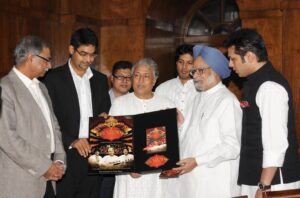
Amjad Ali Khan: In 1984, Mr. Dukakis, the governor, proclaimed April 20th to be Amjad Ali Khan Day. And after all these years, the state of California once again proclaimed April 13th to be Amjad Ali Khan Day! Aman, Ayaan and I all performed during the ceremony, which was held in San Diego. I’m overjoyed that India and the rest of the globe have accepted and supported Aman and Ayaan.
So, my grandchildren, Abir and Zohan, give me the most joy in life. The twin boys are 12 years old. They are just starting out and we refer to our five-person performance as the Sarod Quintet. In addition to countless performances in Kolkata, Bangalore and Chennai, we have played as the Sarod Quintet in New York and at the Netamukhe Cultural Center.
Shikha Duggal: What type of legacy do you hope such global recognition leaves for the upcoming generation of musicians, including your sons?
Amjad Ali Khan: Thank you, God Almighty, for my wife, Subhalakshmi Barua, an Assamese dancer and renowned Bharatanatyam expert, disciple of Rukmini Arundel. And Aman and Ayan came into my life. However, my musical career started at the age of twelve. Every corner of India supported and nurtured me, helping me grow into Amjad Ali Khan and I became an earning member of the family. Through divine intervention, Aman and Ayan eventually came to understand their family’s and their Gharana’s responsibilities. We belong to Senia Binkar Gharana’s property. We are Swami Haridas and Mia Tansen’s humble emissaries.
Shikha Duggal: What creative or personal changes do you think have occurred over the past forty years?
Amjad Ali Khan: Very early in my life, I was given an unexpected award by Prayag Sangeet Samiti, a music school that is still in operation in the country. I was awarded the title of Sarod Samrat by the institution when I was around 15 or 16 years old. Later, I won the Padma Shri in 1975, the Padma Bhushan in 1991 and once again the Padma Bhushan in 2001. Each of these award is a great honour and a constant source of motivation. But particularly when you receive something from a distant region of the world, as was the case in 1984 when Boston, Massachusetts, established Amjad Ali Khan Day.
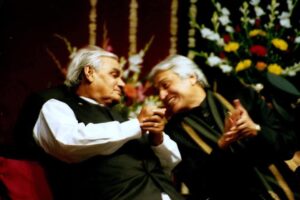
I was awarded the title of Sarod Samrat by the institution when I was around 15 or 16 years old. Later, I received the Padma Shri in 1975, the Padma Bhushan in 1991, and once again in 2001. Each of these honours has been a profound recognition and a constant source of inspiration.
Shikha Duggal: How can innovation and inheritance coexist together without displacing one another?
Amjad Ali Khan: I have a lot of love for Justin Bieber and the young band BTS. My grandsons look up to them as heroes and I also really liked their music. I wrote a piece of music for the Scottish Chamber Orchestra at their request. We call it Samagam. This is the Sarod Concerto, technically. The majority of orchestras throughout the world have performed Samagam and the London Philharmonic Orchestra most recently did so at London’s Royal Festival Hall. Therefore, I like working with others and fusing ideas. Ustad Bismillah Khan, a renowned Shanai Maestro and I have also performed duets with our Indian musicians. We performed as a duet twice, and I performed with a number of outstanding South Indian artists too.
Shikha Duggal: By rejecting strict divisions between classical and popular styles, you have stated that “music is music.” Which discussions over that philosophy have you found to be the most impactful?
Amjad Ali Khan: Duet is a highly difficult subject. Five musicians together become extremely difficult, fulfilling and fun, whereas a trio is more difficult. In the digital age, every circumstance comes with its own set of pros and cons. Thus, the younger generation is increasingly engaging through social media and other digital realm. My grandsons are constantly using their cell phones, as I can see. Thankfully, however, they accept their father Ayaan Ali Bangash’s invitation to practice. (He chuckles softly.)
Shikha Duggal: A lot of your compositions, like Samaagam or Bapukauns, focus on communication—between philosophies, instruments, or civilisations. What part does music play in overcoming silence and hostility in today’s divided world?
Amjad Ali Khan: So, music has brought people together. A priceless gift from God is music. Music, like flowers, air, water, fire, scent and colours, is not religiously associated. As of right now, I can claim to be a member of every faith on the planet. I practice every religion practiced in India. I’ve always believed that the 21st century will be a time of great prosperity and peace. All political parties, however, rely only on religion, which is why we are still at odds about it. Religion is the cornerstone of politics everywhere in the world. Regretfully, manipulation is a far more common game in our nation. The election is won by the person who can manipulate. However, understanding India’s character is quite challenging. The neighbouring nations are unable to comprehend. Indians created Bismillah Khan. Indians were the ones who created Amjad Ali Khan. We rely on one another.
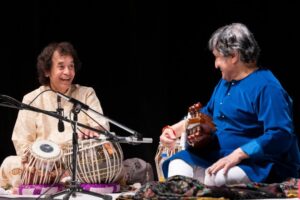
Shikha Duggal: You have performed at the Nobel Peace Prize and United Nations ceremonies, as well as the Central Hall of the Indian Parliament. Does your relationship with the raga you decide to perform that day change as a result of these high-stakes stages?
Amjad Ali Khan: I have a few extremely brilliant disciples who make music their livelihood. Music is their life. I recently gave a concert for the Robotic Surgeons Conference in Delhi, which was attended by my two Bengali students, Dev Shankar and Jyoti Shankar. We are Swami Haridas and Mia Tansen’s humble emissary. In the past, we have relied on one another. The teacher of Rabi Shankar was Ustad Alauddin Khan Sahib. Mian Tan Sen was a student of Swami Haridas. Nobody is aware of who made my sarod. My sarod was constructed by Shri Hemendra Chandra Sen. Thus, the relationship is as follows.
Shikha Duggal: What aspects of your instrument’s emotional spectrum do you think the public misunderstands?
Amjad Ali Khan: I hope we understand the music’s meaning. The globe has been united by music. Nowadays, music is used as therapy. In the medical field, various types of music are used to treat patients. Plants grow more quickly when the music is pleasant. I am aware that yoga is crucial and that cows produce more milk when there is enticing music playing. But because you have to experience the sound, music is just as important—if not more so. Sound is invisible. Music is not shown. Rhythm is invisible to you. The divine presence is palpable. Therefore, when an orchestra performs a piece in the Western world, the composer, conductor and performer all contribute to the piece. However, with God’s grace, we Indian musicians are one and the same.
Shikha Duggal: You have worked with American folk singers, Scottish chamber orchestras and even Joe Walsh. What aspect of you is speaking and what is listening while you’re improvising in these cross-cultural situations?
Amjad Ali Khan: I am embarrassed to admit that it is my line of work. It’s a passion. In classical music, you have to give yourself over to your guru and God. You must give up your life. This is the way I grew up. This is how I live. It’s similar to walking into a pitch-black tunnel with the hopes of seeing the sun at some point. Therefore, my father did not want me to attend school. He was a traditionalist. I pray that the people of India and the rest of the globe treat my kids and grandchildren with the same respect and love. I am appreciative of my family’s support during my international travels. Aman and Ayaan have played a crucial role. I mean, throughout my life, I have always supported young tabla players. Pandit Kishan Maharaj, Pandit Samta Prasad and even my father, who played with all of the Benaras Gharana’s stalwarts, were among the great tabla players I ever shared the stage with. However, I continue to support a lot of new tabla players today.
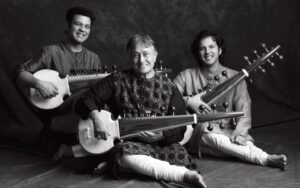
Shikha Duggal: How did writing about your father and guru Haafiz Ali Khan in your memoir My Father, Our Fraternity feel?
Amjad Ali Khan: One becomes a musicologist, he frequently remarked. You live a different kind of life where your life is safe. After earning a B.A., M.A., or Ph.D. in music, you become a musicologist and find employment. However, Pandit Bhimsen Joshi and a number of other great gurus who became the face of India were not educated at any institution and neither were we. Therefore, Guru-Shishya Parampara raised them. However, in 1957, after we moved from Gwalior to Delhi, my father was convinced by friends and disciples that I ought to attend school. For a few years, my compatriots didn’t allow me to finish my education since they began extending their love and invitations to me when I was twelve years old. Because I was always travelling, I missed school. I then went on my first international trip to America in 1963 at the request of the Asia Society, a group of musicians and dancers that included Pandit Birju Maharaj. After spending two months in America, I didn’t return to school when I got back to Delhi. I was able to confront the world as a result of my education over those few years! I spent two months as a resident at Stanford University. I completed residencies at various universities, including Indiana University, Washington University and York University in England. I have completed residencies to teach music instead of sarod.
Shikha Duggal: How can a teacher impart the sarod’s spiritual philosophy and rigour to a younger generation without lessening its profundity?
Amjad Ali Khan: What distinguishes Indian music from Western music? In Western music, they simultaneously write, read and play music. I can’t do that. I honour that tradition and methodology. Every time I travel to Vienna, Austria, it feels like a pilgrimage. It’s like a musical pilgrimage. So, whenever I go to Austria, I touch my forehead to the floor. Austria produced a large number of outstanding musicians, composers and conductors. UNESCO has designated Gwalior as the capital of music and UNESCO director Mr. Tim Curtis recently travelled to Sarodghar, the place where my father and I were born, which makes me extremely delighted. It is, thus, a museum of musical legacy. All of my ancestors’ instruments, which were donated by the great masters in this museum, are kept there. Since Gwalior is so close by, please stop by Sarodghar anytime you are in Delhi or Agra. Thanks to Mia Tansen, Gwalior became a musical city. Emperor Akbar’s court musician was the renowned Mia Tansen. His memorial and Samadhi are located at Gwalior, where he was born. Thus, please enjoy some enticing music. You will experience some sort of holy energy in your body if you listen intently for even five minutes.

